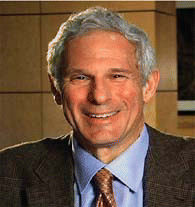Not everyone agrees that the level of toxicity in this patient series is acceptable, however. I would say that the treatment result is not optimal if 17% of these patients are requiring a long-term feeding tube, said Arlene Forastiere, MD, Professor of Oncology and Otolaryngology-Head and Neck Surgery at Johns Hopkins University School of Medicine in Baltimore. The whole point of doing organ preservation therapy, instead of surgery, is to preserve patients’ speech and swallowing function. So if 17 percent of patients are alive but they can’t swallow, it indicates a level of late toxicity with this particular treatment that is counter to the overall goal. You’ve negated the effect on quality of life and everything else with this treatment.
Explore This Issue
May 2008Phase III Clinical Trials
Physicians shouldn’t decide, on the basis of an uncontrolled study, that they are going to treat all their patients in this fashion, Dr. Forastiere continued. They should be putting patients into clinical trials. There are several ongoing randomized phase III trials designed to tease out the value of induction chemotherapy in patients with BOT and other head and neck cancers. We need the answers from those trials, she said.
Such trials are important, according to Marshall Posner, MD, Associate Professor of Medicine at Harvard Medical School and the Dana-Farber Cancer Institute in Boston, who is leading the Paradigm trial (ClinicalTrials.gov Identifier NCT00095875). There are sufficient data from randomized trials to support the use of docetaxel-cisplatin-5-fluorouracil-based induction chemotherapy as a reasonable treatment for patients with locally advanced head and neck cancer. There is also suggestive evidence that it might even be better than chemoradiotherapy alone. The question now is whether induction chemotherapy offers a significant advantage over chemoradiotherapy for organ preservation or survival, he said.
Enrollment in at least one of the trials is going slowly, though. Despite having been open for enrollment since August 2004, the Paradigm trial has accrued only about one-third of the planned patients.
Part of the cause for the slow enrollment, in Dr. Posner’s view, is that the trial is complex, with different radiation doses depending on the trial arm and an individual patient’s response to induction chemotherapy. The induction-plus-chemoradiation arm is so radically different from the chemoradiation arm that it is hard for patients to understand it. It is hard for physicians to explain, he said.
It is hard to do this kind of study. It would be infinitely easier if the Radiation Therapy Oncology Group [RTOG] and ENT physicians were willing to participate in this kind of trial and accepted how important this study question was rather than focusing only on a radiation research agenda, Dr. Posner continued. If we can finish these trials, we can get answers in a timely fashion. Right now the resistance from the RTOG in favor of their research program has made it very difficult to get sites to participate and put patients on these studies. It has really been an impediment to moving forward. There are people, it seems, for whom no induction trial would ever be acceptable.

Leave a Reply